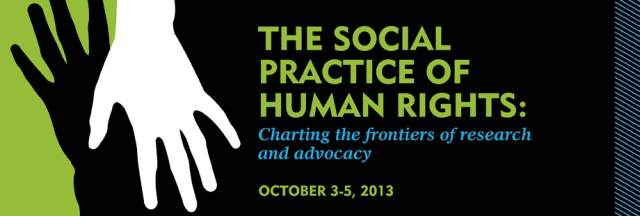Good Freedom: Code of Conduct for Religious Institutions, Faith Communities, and Faith Communities for Their Work with Survivors of Forced Labour, Human Trafficking and Modern Slavery
Location
River Campus - Room 2080
Start Date
10-4-2013 9:30 AM
Abstract
As human trafficking gained visibility as a human rights issue, Christians have been prominent players in the global anti-trafficking movement.[i] Yet not everything that religious organizations, faith communities and faith-based groups have done in the name of ‘helping’ victims of trafficking is morally laudable or ethically acceptable. Proselytization of survivors by religious and faith-based service providers as a condition of ‘rescue’ or receiving services is one set such set of unethical rescue-practices. This paper presents a draft five-point Code of Conduct for religious institutions and groups that work with survivors of human trafficking that is modeled after the International Red Cross and Red Crescent Code of Conduct for NGO disaster response work.[ii] The purpose of the Code of Conduct is to prevent religious commitment and identity from being yet another site of coercion and manipulation that trafficking survivors must endure. A set of points of principle to which all religious and faith-based agencies, organizations and programs should adhere in their work with survivors of human trafficking, the Code of Conduct complements recognized best practices of anti-trafficking work by increasing the accountability of service providers through articulating clear standards to which trafficking survivors have the right to expect that those who seek to assist them will adhere. The Code of Conduct affirms religion as a deeply held human value and religious identity as central to how many individuals understand themselves. Precisely because religious identity is both central to individual identity and malleable (and hence susceptible to coercion), religion is among those human goods that deserves protection.
[i] See generally, Allan D. Hertzke, Hertzke, Freeing God's Children: The Unlikely Alliance for Global Human Rights (NY: Rowman & Littlefield, 2004); Yvonne C. Zimmerman, Other Dreams of Freedom: Religion, Sex and Human Trafficking (NY: Oxford University Press, 2013).
[ii] d’Estrée, Claude and Yvonne Zimmerman. “Code of Conduct for Religious Institutions, Faith Communities, and Faith Communities for Their Work with Survivors of Forced Labour, Human Trafficking and Modern Slavery,” Denver: Human Rights Clinic, Josef Korbel School of International Studies, 2011. http://humantraffickingclinic.org/wp-content/uploads/2012/10/CodeofConduct2.pdf. See, International Federation of the Red Cross and Red Crescent Societies (IFRC), The Code of Conduct for the International Red Cross and Red Crescent Movement and NGOs in Disaster Relief (Geneva, Switzerland: 1994). http://www.ifrc.org/Docs/idrl/I259EN.pdf.
Good Freedom: Code of Conduct for Religious Institutions, Faith Communities, and Faith Communities for Their Work with Survivors of Forced Labour, Human Trafficking and Modern Slavery
River Campus - Room 2080
As human trafficking gained visibility as a human rights issue, Christians have been prominent players in the global anti-trafficking movement.[i] Yet not everything that religious organizations, faith communities and faith-based groups have done in the name of ‘helping’ victims of trafficking is morally laudable or ethically acceptable. Proselytization of survivors by religious and faith-based service providers as a condition of ‘rescue’ or receiving services is one set such set of unethical rescue-practices. This paper presents a draft five-point Code of Conduct for religious institutions and groups that work with survivors of human trafficking that is modeled after the International Red Cross and Red Crescent Code of Conduct for NGO disaster response work.[ii] The purpose of the Code of Conduct is to prevent religious commitment and identity from being yet another site of coercion and manipulation that trafficking survivors must endure. A set of points of principle to which all religious and faith-based agencies, organizations and programs should adhere in their work with survivors of human trafficking, the Code of Conduct complements recognized best practices of anti-trafficking work by increasing the accountability of service providers through articulating clear standards to which trafficking survivors have the right to expect that those who seek to assist them will adhere. The Code of Conduct affirms religion as a deeply held human value and religious identity as central to how many individuals understand themselves. Precisely because religious identity is both central to individual identity and malleable (and hence susceptible to coercion), religion is among those human goods that deserves protection.
[i] See generally, Allan D. Hertzke, Hertzke, Freeing God's Children: The Unlikely Alliance for Global Human Rights (NY: Rowman & Littlefield, 2004); Yvonne C. Zimmerman, Other Dreams of Freedom: Religion, Sex and Human Trafficking (NY: Oxford University Press, 2013).
[ii] d’Estrée, Claude and Yvonne Zimmerman. “Code of Conduct for Religious Institutions, Faith Communities, and Faith Communities for Their Work with Survivors of Forced Labour, Human Trafficking and Modern Slavery,” Denver: Human Rights Clinic, Josef Korbel School of International Studies, 2011. http://humantraffickingclinic.org/wp-content/uploads/2012/10/CodeofConduct2.pdf. See, International Federation of the Red Cross and Red Crescent Societies (IFRC), The Code of Conduct for the International Red Cross and Red Crescent Movement and NGOs in Disaster Relief (Geneva, Switzerland: 1994). http://www.ifrc.org/Docs/idrl/I259EN.pdf.




Comments
This biennial conference provides a unique space for scholars, practitioners and advocates to engage in collaboration, dialogue and critical analysis of human rights advocacy — locally and globally. Learn more about the Human Rights Center at the University of Dayton >>>.